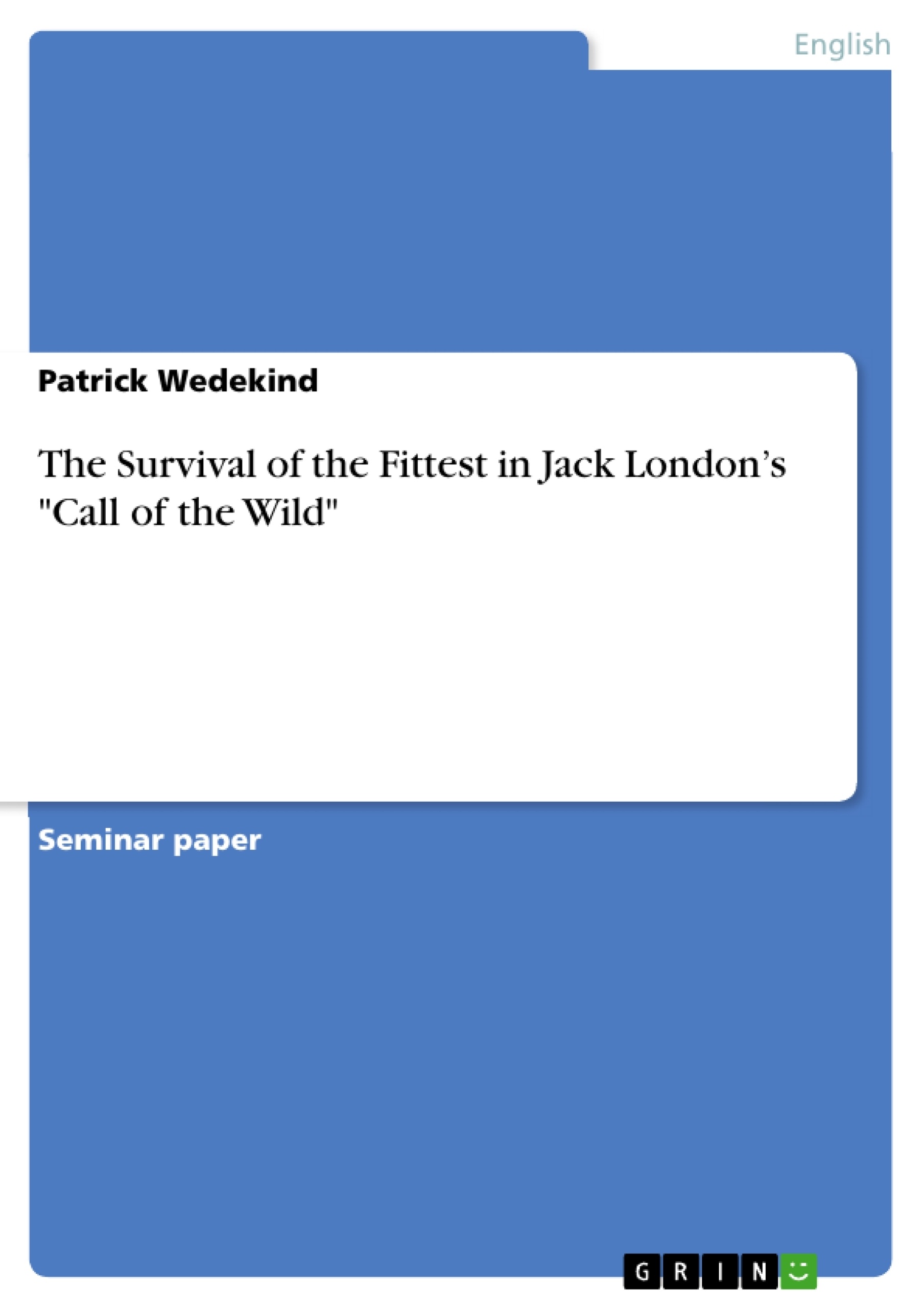In my paper, I will first provide a brief overview of Darwin’s theory of evolution and of social Darwinism, the underlying principles of "Call of the Wild". Afterwards, I will examine the numerous Darwinist and social Darwinist aspects as they appear in the novel itself. This way, I want to help the reader understand why the survival of the fittest plays a major role in "Call of the Wild". Moreover, I want to show what view of human society can be deduced from London’s depiction of life in the novel.
Jack London’s 1903 novel "The Call of the Wild" is a classic example of a literary work dealing with life in the wilderness, the struggle for existence, and the survival of the fittest. Indeed, the survival of the fittest rules all encounters in the story. This realistic way of describing nature as dictated by Darwinian principles is certainly one of the reasons why the story seems so vivid. Another reason for the novel’s vividness is London’s technique of telling the story from the perspective of a dog named Buck, which gives the reader a deep insight into the harsh realities of nature.
The novel begins with the kidnapping of Buck from Judge Miller’s place in California. He is then sold to Canadian mail carriers by a dog seller and experiences the wilderness for the first time in his life when he travels to the Klondike. In the following months, Buck adjusts to his new life and even becomes the new leader of his team of dogs after having defeated his long-time rival Spitz. After his adventures in the Klondike, Buck is sold to inexperienced people that mistreat their sled dogs. Later, he is saved by a man called John Thornton before he would have drowned along with his masters and the rest of his team. In the following part of the book, Buck develops a deep affection for Thornton and the two of them experience many adventures together. When Thornton is killed by a group of Native Americans at the end of the story, Buck finally decides to follow the call of the wild and joins a pack of wolves.
Inhaltsverzeichnis (Table of Contents)
- 1 Introduction
- 2 The Survival of the Fittest
- 2.1 Introduction
- 2.2 Darwinism and Natural Selection
- 2.3 Social Darwinism
- 2.4 Conclusion
- 3 The Survival of the Fittest in Call of the Wild
- 3.1 Introduction
- 3.2 Adaptation to the Environment
- 3.3 The Struggle for Existence
- 3.4 Buck as a Prototype of The Fittest
- 3.5 Social Darwinist Aspects
- 3.6 Conclusion
- 4 Conclusion
- 5 Works Cited
Zielsetzung und Themenschwerpunkte (Objectives and Key Themes)
This paper aims to explore the principles of Darwinism and social Darwinism as they are presented in Jack London's Call of the Wild. The analysis will focus on how these principles manifest within the narrative, specifically examining Buck's journey through the wilderness and his adaptation to the harsh realities of nature. The paper will also consider the implications of London's depiction of nature and society for a broader understanding of human existence.
- Darwinian principles of natural selection and the struggle for existence
- Social Darwinism and its application to human society
- The role of adaptation and survival in the wilderness
- Buck's transformation from domesticated dog to wild animal
- The relationship between nature and human society
Zusammenfassung der Kapitel (Chapter Summaries)
The paper begins by introducing the concept of "survival of the fittest" and its connection to Darwinian principles. It then explores the theory of natural selection, outlining Darwin's ideas of the struggle for existence and the role of variations in species. The paper also discusses social Darwinism, examining its application to human society and its implications for social progress.
The next section delves into the novel Call of the Wild, analyzing its portrayal of Darwinian and social Darwinist aspects. The paper explores Buck's adaptation to the wilderness, his encounters with other animals, and his eventual transformation into a wild creature. It also examines the role of human influence and the impact of social hierarchies on Buck's journey.
Schlüsselwörter (Keywords)
The paper explores key concepts such as natural selection, social Darwinism, survival of the fittest, adaptation, wilderness, human society, and the relationship between nature and culture. It examines the novel Call of the Wild as a literary representation of these themes and their implications for human understanding of the natural world.
- Citar trabajo
- Patrick Wedekind (Autor), 2010, The Survival of the Fittest in Jack London’s "Call of the Wild", Múnich, GRIN Verlag, https://www.grin.com/document/320996
-

-

-

-
¡Carge sus propios textos! Gane dinero y un iPhone X. -

-
¡Carge sus propios textos! Gane dinero y un iPhone X. -

-
¡Carge sus propios textos! Gane dinero y un iPhone X. -

-
¡Carge sus propios textos! Gane dinero y un iPhone X. -

-
¡Carge sus propios textos! Gane dinero y un iPhone X. -

-
¡Carge sus propios textos! Gane dinero y un iPhone X.

